Capacity building impact
Ali Zakaria Babiker: Assessing the genetic diversity of cowpea accessions from Sudan
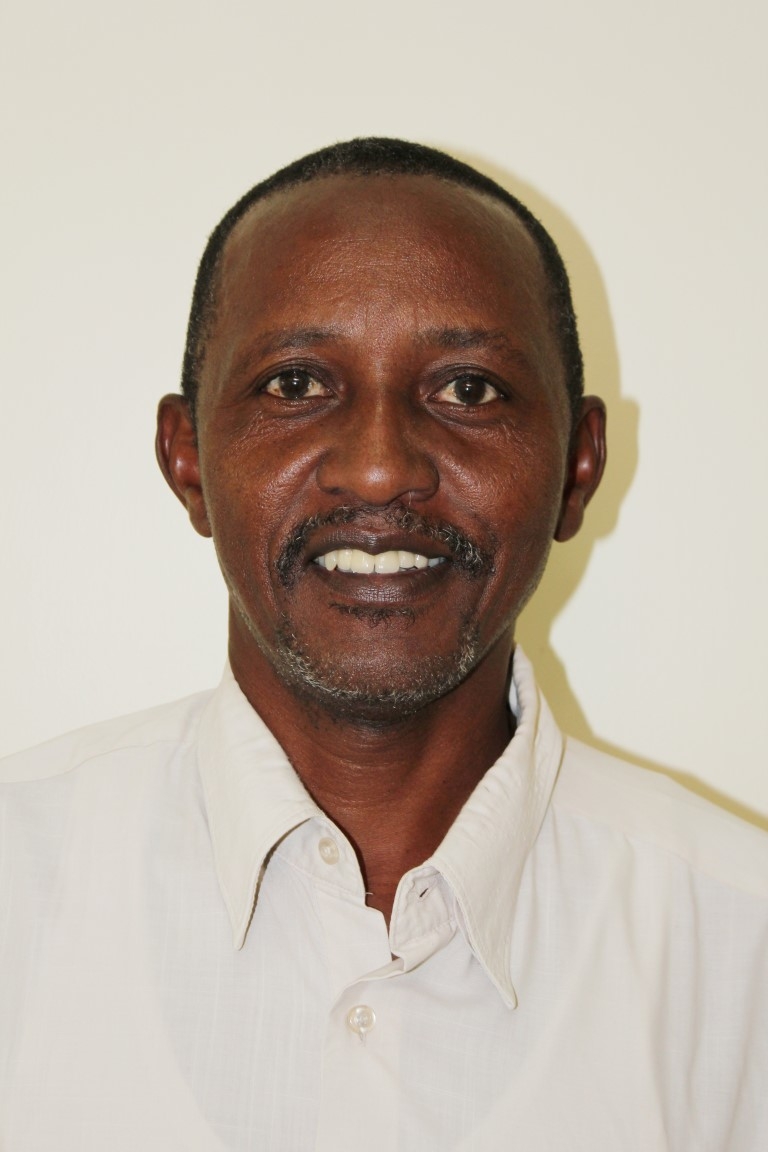 Ali Zakaria Babiker is an assistant research professor in the Plant Genetic Resources Unit at the Agricultural Research Corporation, Sudan and a recipient of the Africa Biosciences Challengue Fund (ABCF) fellowship.
Ali Zakaria Babiker is an assistant research professor in the Plant Genetic Resources Unit at the Agricultural Research Corporation, Sudan and a recipient of the Africa Biosciences Challengue Fund (ABCF) fellowship.
Ali was awarded a fellowship for a period of six months from 7 October 2013 - 7 April 2014 to carry out the assessment of the genetic diversity of cowpea accessions from Sudan using SSR markers.
There are more than 300 cowpea germplasm accessions collected and conserved in Sudan’s GeneBank. All these accessions have been morphologically characterized using an international descriptor list but this data lacks the complementary genetic information. Conventional selection for desirable traits in cowpea breeding mainly depends on phenotypic variation which can easily be influenced by environmental and human factors. In addition, despite the importance of cowpea as a food crop for many African countries, it is still relatively under-researched.
This research was developed to establish the extent of genetic diversity in the Sudanese cowpea collection maintained at the Plant Genetic Resources Unit of Sudan; and to create a core collection of cowpea that will contribute to the development of improved varieties in Sudan.
About his achievements, Ali says:
"The ABCF fellowship enabled me to fulfill part of the requirements for promotion at my institution. While at the BecA-ILRI Hub, I submitted a manuscript of my work for publishing and in collaboration with colleagues from Burundi, Kenya and Tanzania, developed a proposal for funding by ASARECA on “Developing and up scaling technologies and innovations for management of Maize Lethal Necrosis Disease In Eastern And Central Africa.”
From the research conducted at the BecA-ILRI Hub, I was able to group Sudanese cowpea germplasm under three categories which will be used to determine suitable ecological zones for different varieties. I held a seminar at my home institute to share my findings and invited breeders and other researchers to visit the genebank and our field during the growing season for more detailed explanations.
I faced a lot of challenges doing the same research in my home country because we do not have the facilities available at the BecA-ILRI Hub. At the BecA-ILRI Hub I had access to well-equipped labs, well trained research assistants and good supervision. "
___________________________________________________________________________________________________________________________
Christopher Mukasa: Harnessing genetic diversity for conservation, disease resistance and improved productivity of goats in Uganda and Nigeria
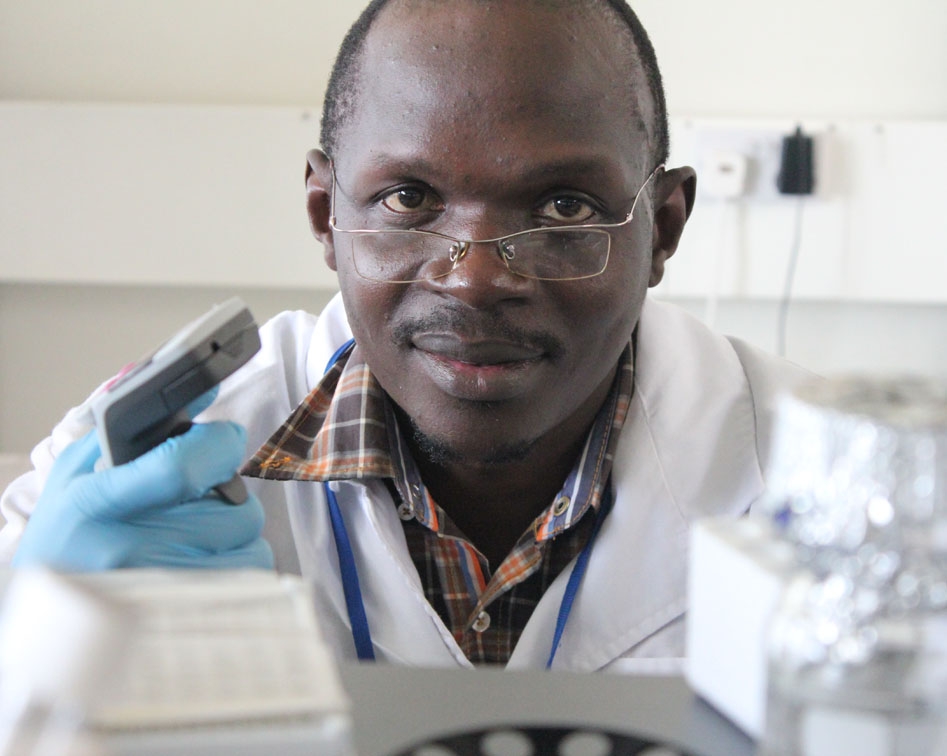 Christopher Mukasa is a Research Geneticist at the National Animal Genetic Resource Centre and Data Bank in Entebbe, Uganda. He is also the Principal Investigator for a project - “Harnessing genetic diversity for conservation, resistance to disease and improving productivity in some African goats” and a recipient of the Africa Biosciences Challenge Fund (ABCF) fellowship.
Christopher Mukasa is a Research Geneticist at the National Animal Genetic Resource Centre and Data Bank in Entebbe, Uganda. He is also the Principal Investigator for a project - “Harnessing genetic diversity for conservation, resistance to disease and improving productivity in some African goats” and a recipient of the Africa Biosciences Challenge Fund (ABCF) fellowship.
Christopher was awarded a fellowship for a period of five and a half months from 12 June – 21 November 2012, to study the genetic diversity of indigenous goats in Uganda and Nigeria.
Goats serve as a secure form of investment, a means of income, source of manure and for various religious and ceremonial functions to many communities in sub-Saharan Africa. Indigenous goat breeds are more important to small-scale farmers than cattle since they are easier to acquire and maintain. These animals often provide the only practical means of utilizing vast areas of natural grasslands in the areas where crop production is uneconomical.
The primary constraints faced by goat smallholders in sub-Saharan Africa are mortalities; reduced production due to diseases caused by internal and external parasites; and direct costs associated with pest control.
There is well-documented evidence for within and between breed genetic variation in resistance to gastrointestinal nematode infections; diseases due to mycotoxins; bacterial diseases including foot rot and mastitis; ectoparasites such as flies and lice; and scrapie, the small ruminant transmissible progressive disease affecting the animals’ brain and nervous system. Genetic disease resistance is particularly relevant in developing countries, as indigenous breeds usually display enhanced resistance to local diseases compared to exotic ones reared in the same environment. However, little is known on the genetic components affecting adaptation to local environments as well as similar ecological regions worldwide.
A better understanding of genetic diversity of African goats will contribute to sustained genetic improvement and facilitate rapid adaptation to changing environments and breeding objectives, thus meeting growing production needs in various environments.
About his achievements, Christopher says:
"During my fellowship at BecA, I wrote a proposal to study functional genomics and epigenetics in African cattle and candidate gene analysis in sheep and goats for the United States Department of Agriculture (USDA). My proposal interested some colleagues from USDA and Cornell University and together we wrote a proposal on functional genomics and epigenetics in African cattle and candidate gene analysis in sheep and goats that will be funded by Cornell University.
The project is being implemented successfully in a few developing countries in Africa. We hope to raise more funds and extend it to as many countries as possible in Africa.
I owe my successful proposal submission and all the skills I am now using in running my project to the time I spent at the BecA-ILRI Hub. Professionally, the BecA-ILRI Hub team is truly my maker. As an alumnus I am committed to doing the Hub proud everywhere that science takes me. I am grateful for the golden opportunity afforded me through the ABCF Fellowship."
_______________________________________________________________________________________________________________________
Joan M. Babajide: Understanding the genetic diversity of microbial community in steep water of traditional dried yam – ‘gbodo’
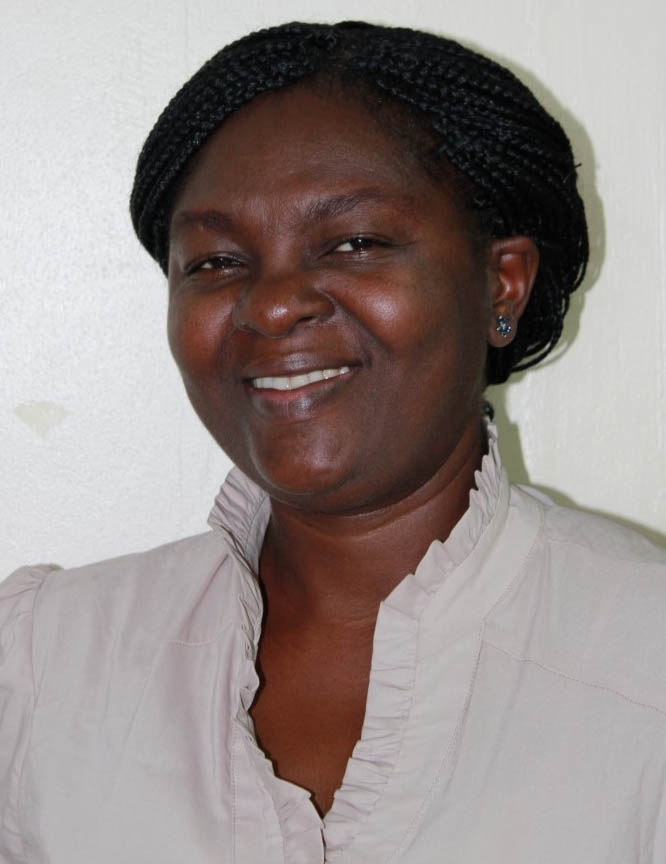 Joan M. Babajide is a lecturer at the Federal University of Agriculture, Abeokuta, Nigeria and a recipient of the Africa Biosciences Challenge Fund (ABCF) fellowship. Her fellowship was co-funded by African Women in Agricultural Research and Development (AWARD).
Joan M. Babajide is a lecturer at the Federal University of Agriculture, Abeokuta, Nigeria and a recipient of the Africa Biosciences Challenge Fund (ABCF) fellowship. Her fellowship was co-funded by African Women in Agricultural Research and Development (AWARD).
Joan was awarded a fellowship for a period of five and a half months from 11 April – 25 September 2013, to carry out studies on the genetic diversity of the microbial community in steep water of ‘gbodo’ – the traditional dried yam.
‘Gbodo’ is a traditionally processed yam in rural Nigeria and other parts of West Africa that is dried, parboiled and fermented by steeping in water for days. The fermented yam ‘gbodo’ is then milled into flour which has a distinctive taste, colour and texture depending on the fermentation process. Sometimes the steep water is repeatedly re-used to enhance the desired qualities of subsequent products and reduce the steeping time. The actual organisms responsible for the desired attributes are however yet to be fully ascertained.
The identification of micro-organisms in steep water could lead to improvement in the processing. The specific microorganisms responsible for achieving the desired quality characteristics of ‘gbodo’ could be cultured in large quantity and sold serving as an additional source of income for ‘gbodo’ processors.
This study aimed at understanding the genetic diversity of the fungi and bacteria present in the steep water at the fermentation stage in ‘gbodo’ production in order to support the improvement of the process.
About her achievements, Joan says:
"Out of the work I did at the BecA-ILRI Hub, I generated two posters that I presented at the International Society for Tropical Root Crops (ISTRC) conference in Ghana (Sept 30 – Oct 5, 2013) and at the Nigerian Institute of Food Science and Technology (NIFST) conference in Nigeria (22-26 Oct 2013). One of my posters was awarded the Best Poster Presentation.
I am now transferring the skills I learned at the BecA-ILRI Hub in molecular analysis, good laboratory practice and health and safety to the molecular laboratory at the Federal University of Agriculture, Abeokuta and to the students I teach. I am also supervising postgraduate students in area of basic molecular biology."
_______________________________________________________________________________________________________________________________________________
Felix Meutchieye: Investigating the diversity of Cameroon native goat populations
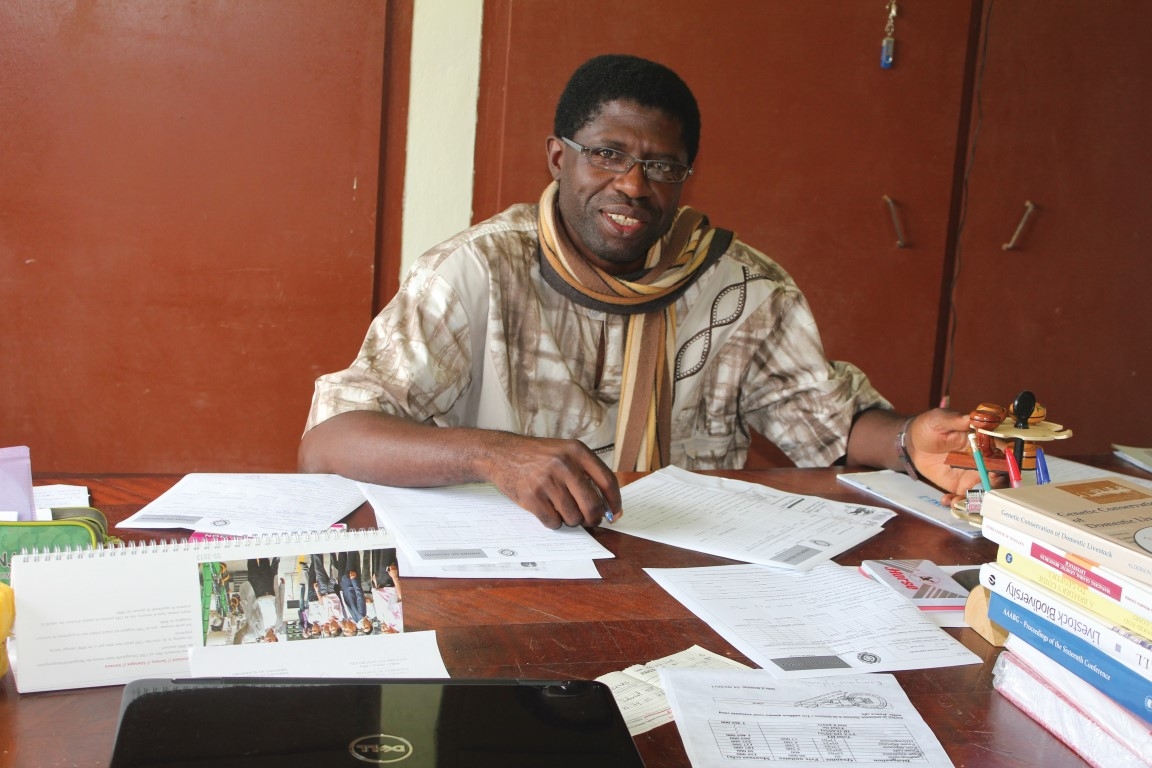 Felix Meutchieye is a lecturer at the University of Dschang, Cameroon; the Principal Investigator (PI) in BecA-ILRI Hub led project - “Harnessing husbandry of domestic cavy for alternative and rapid access to food and income”; and the Co-PI in BecA-ILRI Hub led project “Harnessing genetic diversity for improving goat productivity in Africa”.
Felix Meutchieye is a lecturer at the University of Dschang, Cameroon; the Principal Investigator (PI) in BecA-ILRI Hub led project - “Harnessing husbandry of domestic cavy for alternative and rapid access to food and income”; and the Co-PI in BecA-ILRI Hub led project “Harnessing genetic diversity for improving goat productivity in Africa”.
Felix was awarded a fellowship to conduct research in two stages. The first stage was to receive training in the application of molecular techniques for one month in October 2010; the second stage was to apply these techniques in conducting a broad investigation on “Cameroon native goat population genetic diversity” from 1 August – 27 October 2011.
Small ruminants are present in more than 80% of production systems throughout the wide range of Cameroon ecological regions. Goats are more resilient and adapted to different husbandry conditions, but the diversity of local goat populations is not well documented.
The aim of the research was to contribute to a better knowledge of goat genetic landscapes in Cameroon. The information from this research will be used to improve goat productivity for increased food security and incomes for rural communities. The main findings are also intended for use by policy makers to build sustainable and comprehensive national goat breeding schemes.
About his achievements, Felix says:
As a result of my placement at the BecA-ILRI Hub, I was able to generate four papers and give oral presentations at five international events. My teaching, research and leadership skills have improved immensely and I proposed three new courses now being taught in my home institution (basic bioinformatics, molecular genetics and conservation genetics).
During the placement, I was involved in proposal writing that led to an Australian funded project on improvement of domestic cavies spanning Cameroon and the Democratic Republic of Congo (DRC) and a Swedish funded project on genetic improvement of goat productivity covering Cameroon and Ethiopia. Over 20 postgraduate students from Cameroon and DRC have received training within the framework of these projects. The projects have also stimulated the establishment of several partnerships between my institution and local and regional organizations.
The fellowship program at BecA-ILRI Hub is very unique, challenging and holistic. The networking, follow-up and continuous communication makes this program a powerful tool to help African scientists overcome challenges they face in keeping their research relevant and up-to-date. I am very grateful for the mentorship I received from the BecA-ILRI Hub team.
____________________________________________________________________________________________________________________________
Célestine Bembide: Understanding the diversity of native chicken populations in Central African Republic
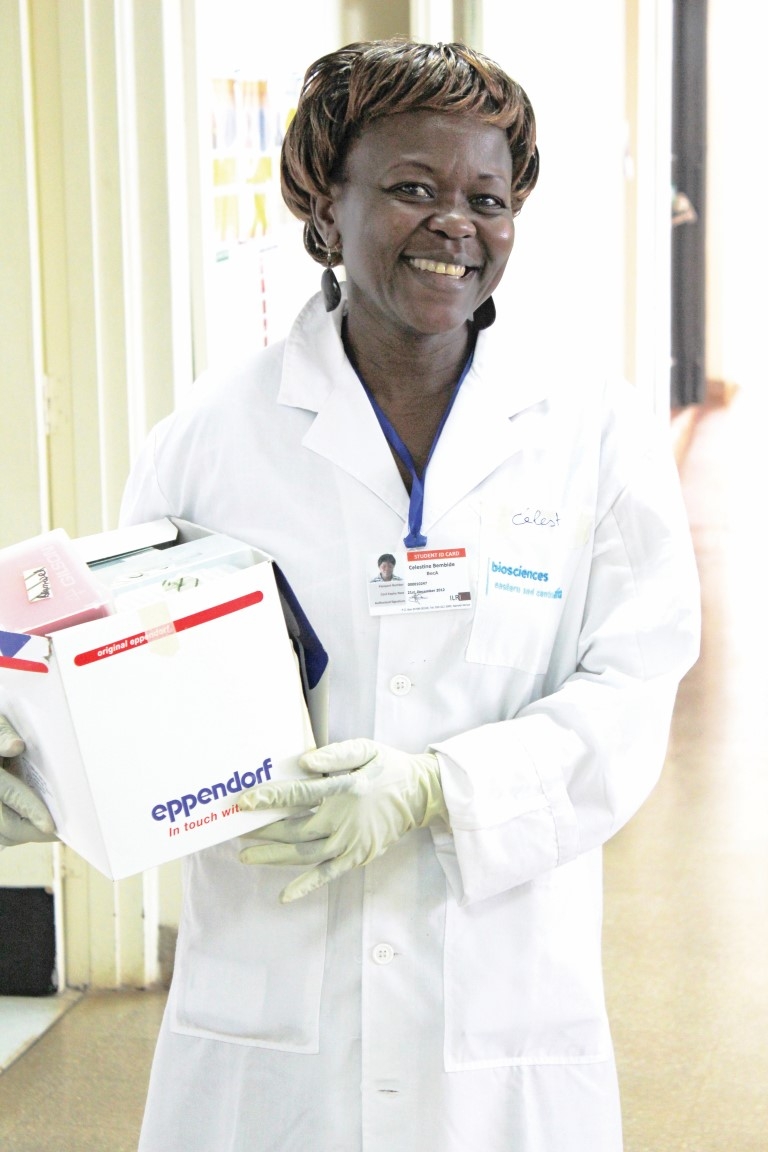 Célestine Bembide is a researcher in Animal Breeding and Genetic Improvement at the Central African Agricultural Research Institute, Central African Republic and a recipient of the Africa Biosciences Challenge Fund (ABCF) fellowship.
Célestine Bembide is a researcher in Animal Breeding and Genetic Improvement at the Central African Agricultural Research Institute, Central African Republic and a recipient of the Africa Biosciences Challenge Fund (ABCF) fellowship.
Célestine was awarded a fellowship to carry out the genetic diversity studies of native chicken populations in Central African Republic for a period of five months from 23 July – 21 December 2012.
Native chicken are the most widely distributed livestock in sub-Saharan Africa. In Central African Republic, native chicken play an important role in poverty alleviation and food security, supplying quality protein through meat and eggs to families in the rural areas where almost all households keep these livestock.
The genetic make up of the indigenous chicken gives them the ability to adapt and survive in the challenging environmental and ecological conditions including drought and disease, associated with farming in the Cental African Republic.
A better knowledge of this species will facilitate the development of strategies for genetic improvement and conservation of genetic resources.
About her achievements, Célestine says:
"Before my placement at the BecA-ILRI Hub, such research on our national livestock resources had never been conducted. At first, I was worried about my lack of experience in using molecular tools but this was never a problem since the BecA-ILRI Hub staff helped me to quickly acquire the skills and apply them in my research.
My experience has helped other researchers from my home institution and country to think about incorporating molecular biology in research and they are now looking for opportunities to put this into practice. I would like to continue my research on native chicken until I can identify the best breed for our local production systems and develop strategies for their conservation.
I encourage all researchers to apply for the ABCF fellowship, especially the French speakers. I am a French speaker but I was able to work and present my work progress to an English speaking audience."
____________________________________________________________________________________________________________________________
Geofrey Kawube: Understanding the genetic diversity of Napier grass in Uganda
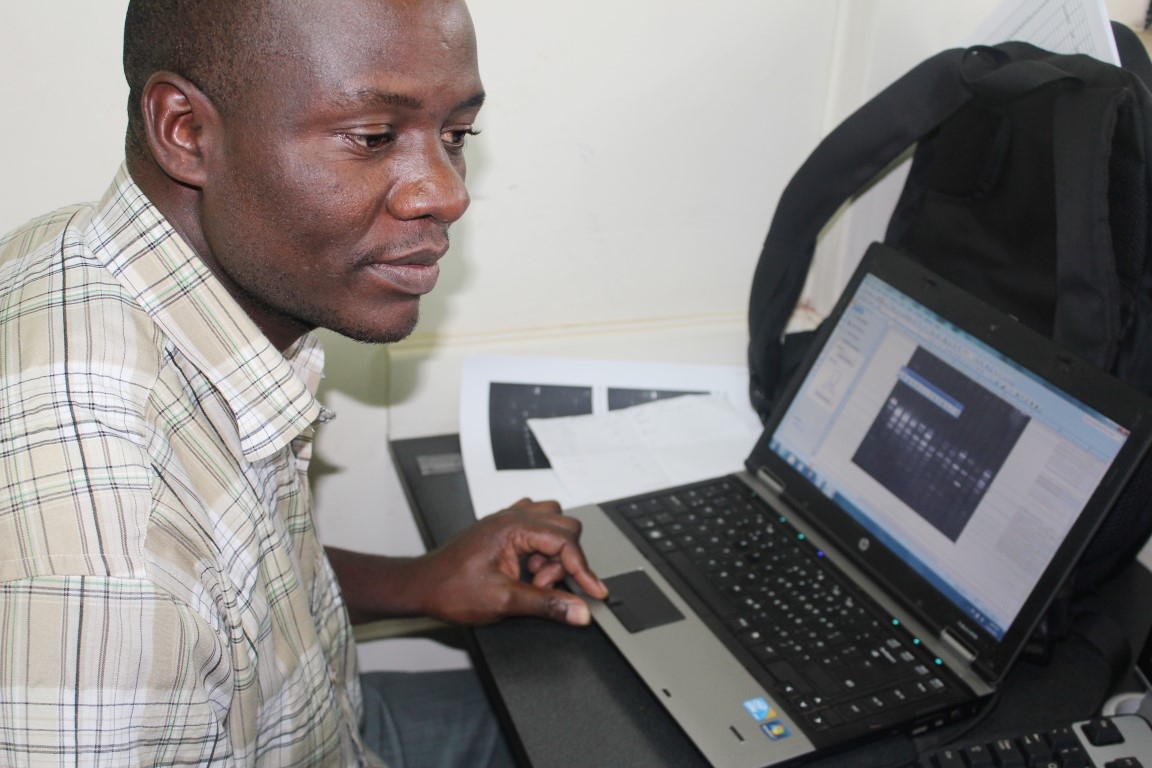 Geofrey Kawube is a lecturer in Plant Pathology at the Gulu University, Uganda and a recipient of the Africa Biosciences Challenge Fund (ABCF) fellowship.
Geofrey Kawube is a lecturer in Plant Pathology at the Gulu University, Uganda and a recipient of the Africa Biosciences Challenge Fund (ABCF) fellowship.
Geofrey was awarded a fellowship for a period of seven months from 8 October 2012 – 5 May 2013 to determine the genetic diversity of Napier grass in Uganda.
The livestock subsector has been identified by the government of Uganda as key in eradicating poverty in the country. Due to increasing population pressure, intensive and semi intensive livestock keeping systems are being promoted in the country with Napier grass as the main fodder. However, livestock productivity is constrained by Napier grass stunt disease which causes fodder yield loss of as high as 100 per cent.
Developing host resistance would be the most effective and affordable means of managing this disease especially by smallholder farmers, majority of whom are poor. In order to develop stunt-resistant Napier grass, sources of resistance must be identified either from already cultivated varieties or wild clones or both.
This study was conducted to determine the genetic diversity of cultivated and wild Napier grass germplasm in Uganda, which will form the basis for efficient decision making for screening for resistance against Napier grass stunt disease, conservation and genetic improvement.
About his achievements, Geofrey says:
"While I was at the BecA-ILRI Hub, I learnt a lot about genetic markers, simple sequence repeat (SSRs) and sequence related amplified polymorphism (SRAP), their analysis and application. With this knowledge, I am guiding postgraduate and other researchers wishing to use these genetic markers in investigation at my home institution. I teamed up with two other colleagues to develop a proposal for research that will contribute to the basic understanding of the cause and management of pineapple heart rot disease. We look forward to funding from the National Agricultural Research Organization (NARO). We are looking forward for other funding opportunities so as to help make our dreams a reality. I have also made progress with my PhD studies as a result of the placement at the BecA-ILRI Hub.
The time spent at the BecA-ILRI Hub improved my research capacity and has opened many opportunities for scientific advancement. The skills I acquired are impacting other researchers and hopefully will increase the research capacity in Uganda. I am grateful for the mentorship I received from the team of very talented scientists."
________________________________________________________________________________________________________________
Cécile Annie Ewane: Profiling banana and plantain genotypes from the African Centre for Research on Banana and Plantain (CARBAP)
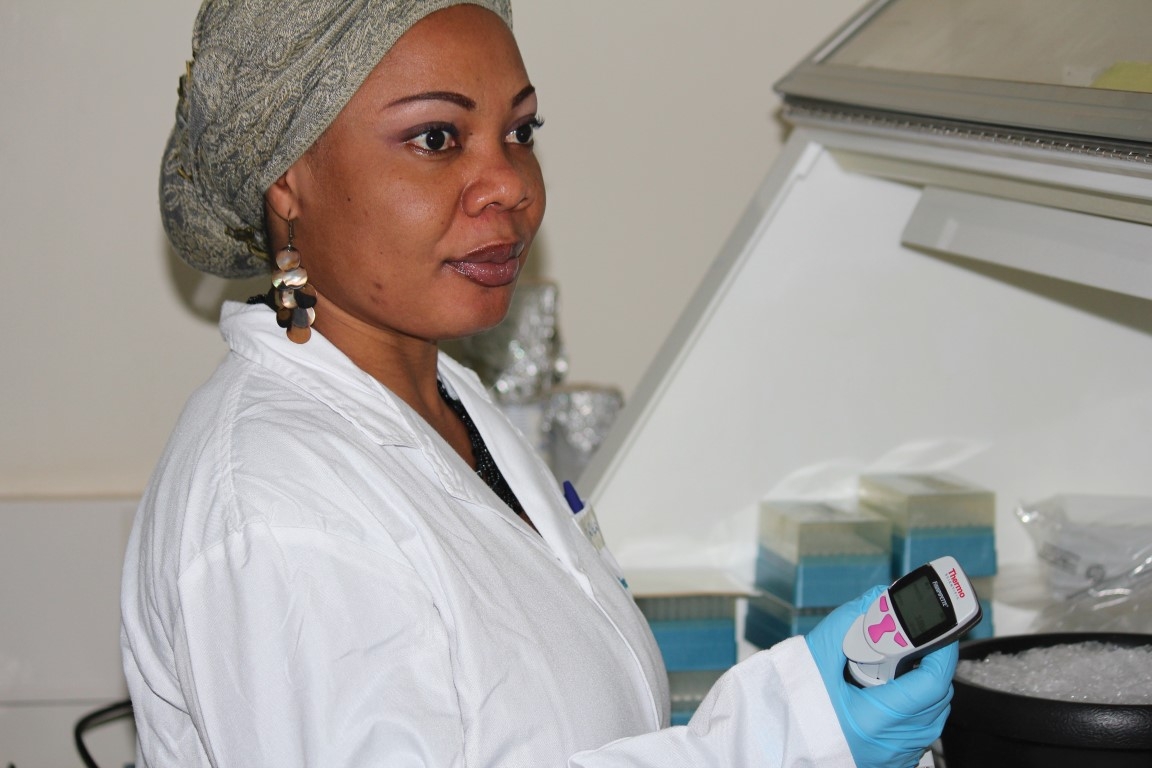 Cécile Annie Ewane is a senior lecturer and associate chief of the Laboratory of Phytoprotection and Valorization of Plant Resources, Biotechnology Center (Nkolbisson) at the University of Yaoundé 1, Cameroon. She is also a recipient of the Africa Biosciences Challenge Fund (ABCF) fellowship.
Cécile Annie Ewane is a senior lecturer and associate chief of the Laboratory of Phytoprotection and Valorization of Plant Resources, Biotechnology Center (Nkolbisson) at the University of Yaoundé 1, Cameroon. She is also a recipient of the Africa Biosciences Challenge Fund (ABCF) fellowship.
Cécile was awarded a fellowship for a period of four and a half months from 3 August – 20 December 2012, to carry out the molecular characterization of banana and plantain genotypes from the African Centre for Research on Banana and Plantain (CARBAP), and to link molecular data to phenotypic data previously generated in CARBAP, Cameroon.
Plantains are a major staple food in West and Central Africa and play a vital role in contributing to food security for more than 250 million people in this region as indicated by the very high per capita consumption in Gabon and Cameroon (159 and 126 kg/person/year respectively). Plantain production for food or for sale on local markets is managed by smallholder farmers in small sized family farm holdings and in home gardens which are characterised by low productivity. As a result, demand largely outstrips supply provoking very high prices for this commodity on rural, urban and trans-border markets. There is a great need to improve the performance of this crop from about 10 tons/ha/year to more than 30 tons/ha/year.
CARBAP in Cameroon hosts and conserves the world’s second largest collection of Musa world reference materials. CARBAP’s breeding programs have led to the development of a number of improved plantain varieties with consistently superior performance regarding yield and resistance to diseases and pests. However CARBAP does not have information on the genetic profiles of these accessions. Proper profiling of these collections will help streamline the materials and maintain only essential accessions.
About her achievements Cécile says:
My ABCF experience helped me acquire knowledge in molecular biology, skills in people management and improve my English language skills. I acquired tools that are useful in teaching, training and introducing young researchers into the research field. I am also trying to improve the level of research at the Biotechnology Center in Nkolbisson, Yaoundé using the skills I acquired and through the network of researchers I formed during my fellowship at the BecA-ILRI Hub. My work at the BecA-ILRI Hub was the forerunner of a bigger project at CARBAP which will lead to the characterization of the whole CARBAP collection of plantain and bananas. I am currently writing a project proposal that will leverage further funding through the ABCF and of course, look forward to many publications of the findings from my work.
The fellowship at BecA-ILRI Hub was a wonderful experience for me. I gained confidence in conducting research and presenting my work. I have had the opportunity to work in similar facilities in Europe before, but thanks to the BecA-ILRI Hub, its partners and donors there is no need to travel so far any more!
___________________________________________________________________________________________________
Parfait Kouadio Kouakou: Investigating the genetic diversity of domestic cavies in Côte D’Ivoire
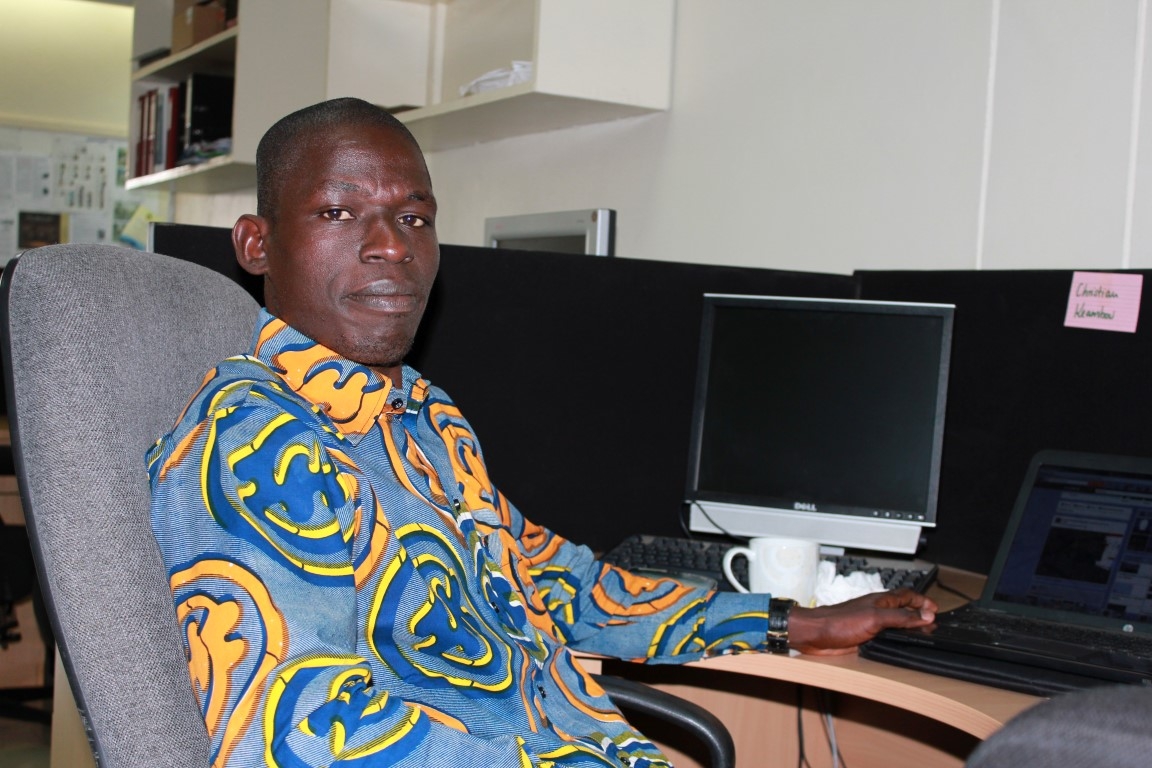 Parfait Kouadio Kouakou is a lecturer in Animal Breeding and Genetic Improvement at the University Peleforo Gon Coulibaly of Korhogo, Ivory Coast and a recipient of the Africa Biosciences Challenge Fund (ABCF) fellowship.
Parfait Kouadio Kouakou is a lecturer in Animal Breeding and Genetic Improvement at the University Peleforo Gon Coulibaly of Korhogo, Ivory Coast and a recipient of the Africa Biosciences Challenge Fund (ABCF) fellowship.
Parfait was awarded a fellowship for a period of five months from 15 May – 15 October 2012 to carry out studies on the genetic diversity of domestic cavies in Côte d’Ivoire.
The demand for animal protein in Africa has risen due to growing populations; rising urbanization; and, to an extent, increased wealth. Despite this, many households do not get a regular supply of animal protein from large livestock due to its cost and cultural issues, where large livestock are viewed as a source of wealth and prestige.
Domestic cavies can be used to address this nutrition gap both quantitatively and qualitatively. Cavies require little investment, feed from kitchen waste and yield an inexpensive but high quality meat. The cavy has rapid growth, high reproductive rate with up to five litters per year, and is less prone to diseases than chickens, rabbits and pigs. In addition to nutrition, trade in cavies has served as a source of income and cavy farming is increasingly becoming a viable commercial activity.
Despite its potential, the cavy is a neglected livestock species and little is known about husbandry practices or existing breeds. The aim of this study was to investigate the diversity, inbreeding levels and population structure of cavies in Côte d’Ivoire so as to better inform the breeding strategies to be used in improving small-scale cavy farming.
About his achievements, Parfait says:
While I was at the BecA-ILRI Hub, I wrote a proposal for the Africa-Brazil Agricultural Innovation Market Place. My proposal interested researchers from other universities in Cote d’Ivoire and Burkina Faso, and together we wrote a proposal on improvement of the guinea fowl and the grasscutter as small livestock. The proposed project is to be implemented in three regions of Côte d’ivoire and has already attracted the interest of farmers in these regions.
Although the project was not selected for this specific funding my colleagues and I are hopeful that we can secure funding for it from other sources.
I owe the skills I am now using in my research to the training and mentorship I received from the very dedicated BecA-ILRI Hub team. My special thanks go to leadership and the team of research technicians who supported me throughout my stay.
______________________________________________________________________________________________
Benson Onyango: Evaluating contribution of Rhizobium bacteria, which are associated with Bambara goundnuts, to soil fertility
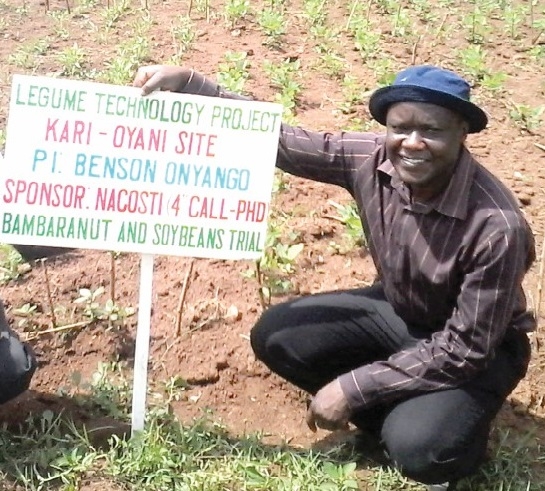 Benson Onyango is a lecturer of Plant Sciences at the Chuka University in Kenya; Co-Principal Investigator, “Bambara groundnuts -sorghum cropping and soil fertility management strategies for improved productivity in semi-arid regions of East Africa” and recipient of the Africa Biosciences Challenge Fund (ABCF)
Benson Onyango is a lecturer of Plant Sciences at the Chuka University in Kenya; Co-Principal Investigator, “Bambara groundnuts -sorghum cropping and soil fertility management strategies for improved productivity in semi-arid regions of East Africa” and recipient of the Africa Biosciences Challenge Fund (ABCF)
Benson was awarded a fellowship for a period of six months from 31 April – 30 October 2013, to carry out the genetic characterization of rhizobium, the bacteria responsible for nitrogen fixation in Soybean and Bambara groundnuts.
Bambara groundnut is an important legume crop with a huge potential of providing protein rich diets and improving the food security situation in sub-Saharan Africa. The crop can tolerate the marginal growing conditions of semi-arid parts of Africa while raising soil fertility through nitrogen fixation that can result in substantial increase in crop productivity. However, the crop is currently underutilized in East African agriculture with most farmers concentrating on maize and common beans. Local landraces of the groundnuts are mostly cultivated by women and insignificant efforts have been made to improve them.
This project aimed at evaluating the diversity of rhizobium bacteria which associate with Bambara groundnuts in the soils of Lake Victoria basin; determining the extent to which local Bambara groundnut landraces deliver nitrogen to the soil; and the effect of increased soil nitrogen on the yield of crops grown under intercrop. The findings of this research will provide an opportunity to raise Bambara groundnuts and intercropped cereal crops productivity, expanding the production base in East Africa to enhance food security and reduce poverty among semi-arid resource poor farmers.
About his achievements, Benson says:
"During my placement at the BecA-ILRI Hub, I wrote a joint proposal with researchers from Southern Cross University, Australia; Crops for the Future Research Centre, Malaysia; Washington State University, USA; and Agricultural Research Institute-Ilonga, Tanzania on Bambara groundnuts-sorghum cropping and soil fertility management strategies for improved productivity in semi-arid regions. We used advice given to us by the Bill & Melinda Gates Foundation to improve the proposal and submitted it to a different funding body where it is currently under review. I also got involved in a collaborative project with Kenya Agricultural Research Institute (KARI) which will teach farmers in western Kenya how to inoculate Bambara groundnuts with rhizobium bacteria to increase production. The rhizobium samples to be used are those that I characterized at the BecA-ILRI Hub.
I sincerely thank the BecA-ILRI Hub team for developing me as a scientist. I learnt invaluable skills in molecular biology and bioinformatics which I will continue to apply as I develop in my career. I gained massive information during bench-work, the weekly progress meetings and from internal seminars organized at the BecA-ILRI Hub."
_________________________________________________________________________________
Helen Nigussie: Understanding the genetic diversity of local sheep populations in Ethiopia
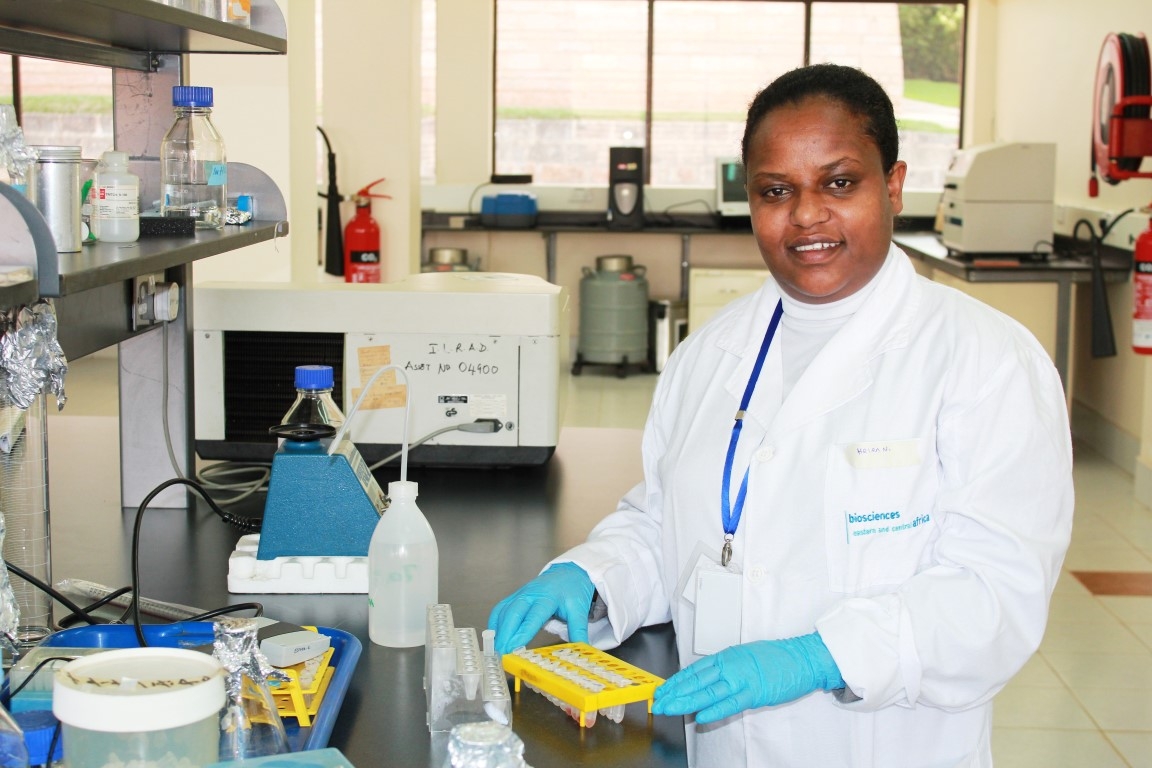 Helen Nigussie is a lecturer in Animal Breeding and Genetics at the Ambo University in Ethiopia, a PhD student at Haramaya University, Ethiopia and a recipient of the Africa Biosciences Challenge Fund (ABCF) fellowship.
Helen Nigussie is a lecturer in Animal Breeding and Genetics at the Ambo University in Ethiopia, a PhD student at Haramaya University, Ethiopia and a recipient of the Africa Biosciences Challenge Fund (ABCF) fellowship.
Helen was awarded a fellowship for a period of six and a half months from 5 June – 15 December 2013. Her project was a study of the genetic diversity and matrilineal genetic origin of local sheep populations of eastern Ethiopia. The project also included linking molecular data to the phenotypic data previously collected on local sheep in the country.
Sheep are the second most important livestock in Ethiopia after cattle, with a population of about 24.2 million heads. These livestock play a major role in the food security and social well-being of rural populations living under conditions of extreme poverty in Ethiopia. Out of the total sheep population in Ethiopia, 99.7% are indigenous breeds with a diversity of nine local breeds found across different agro-ecological zones ranging from mountainous highlands to arid pastoral lowland areas.
Unfortunately, the productivity of indigenous sheep in Ethiopia is currently very low. Improved productivity of local sheep would contribute to the alleviation of food insecurity and poverty of farmers and pastoralists.
The focus of this study was to understand the genetic diversity, population structure and maternal genetic origin of indigenous sheep. Eastern Ethiopian sheep have an outstanding adaptation for feed scarcity, high temperature and disease resistance. Findings from the study will help to set up a sustainable genetic sheep improvement and conservation program.
About her achievements, Helen says:
"While at the BecA-ILRI Hub, I acquired experience in molecular biology which I applied to my research. I also gained confidence in conducting laboratory work independently. I was fortunate to have the opportunity to participate in different workshops including the annual Advanced Bioinformatics and Scientific Research Paper Writing workshops which gave me skills that will greatly advance my career. I have shared my experience with my colleagues and will contribute more to the research and teaching activities at my university.
My experience in molecular techniques, data analysis and all other skills I am now using in writing my dissertation are thanks to my fellowship at the BecA-ILRI Hub. The few months spent with the most talented scientists in my field and with a very dedicated team of people have impacted me forever!"
______________________________________________________________________________________
